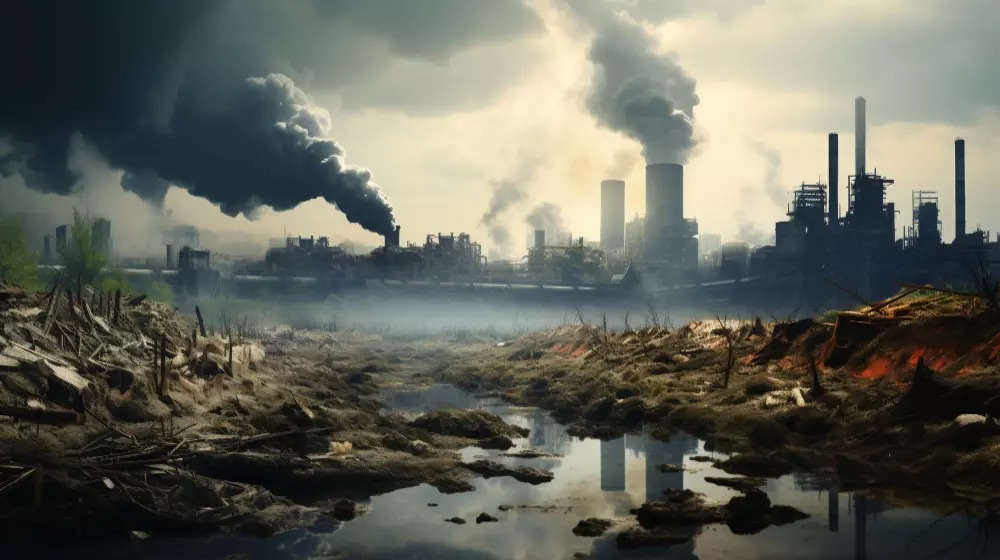On December 2-3, 1984, the city of Bhopal in central India experienced one of the worst industrial disasters in history. The leakage of methyl isocyanate (MIC) gas from a pesticide plant operated by Union Carbide India Limited exposed thousands to toxic fumes, leading to immediate and long-term health consequences. This tragic event has since become a focal point for discussions on industrial safety , corporate responsibility , and environmental justice .
The Catastrophe Unfolds
In the early hours of December 3, 1984, approximately 40 tons of toxic MIC gas leaked into the atmosphere. The release spread quickly across the densely populated areas surrounding the plant, catching sleeping residents by surprise. Many woke up to burning sensations, coughing, and difficulty breathing, unaware of the catastrophe that was unfolding around them.
Immediate Impact and Death Toll
The gas leak led to the deaths of thousands within the first few days. Official estimates vary widely, with initial counts citing around 3,000 immediate deaths, while subsequent reports and health assessments suggest that the disaster ultimately claimed over 15,000 lives and left hundreds of thousands suffering from chronic health issues. The impact on survivors continues to this day, with lingering respiratory problems, vision impairment, and other health complications.
Environmental and Health Consequences
Beyond the immediate fatalities, the long-term environmental damage was severe. The chemical contamination of soil and groundwater has had lasting effects on the local ecosystem and on public health. Many residents still suffer from birth defects, cancers, and other chronic illnesses resulting from their exposure to MIC and other contaminants.
Investigation and Accountability
Investigations revealed that inadequate safety protocols, including poor maintenance of equipment and a lack of proper safety training for workers, contributed to the disaster. The plant's safety systems had reportedly been turned off to cut costs, leading to a catastrophic failure. The parent company, Union Carbide Corporation (now owned by Dow Chemical), faced significant scrutiny, sparking an international debate over corporate responsibility.
Legal Battles and Compensation
Following the disaster, numerous legal battles ensued over accountability and compensation for victims. In 1989, Union Carbide reached a settlement with the Indian government, agreeing to pay $470 million in compensation. However, victims and activists argue that the compensation was inadequate and failed to address the full scale of health and environmental damage. Calls for further justice continue to this day, with activists demanding Dow Chemical take responsibility for additional cleanup and compensation.
Safety Reforms and Regulations
The Bhopal gas tragedy served as a wake-up call, prompting a re-evaluation of industrial safety practices worldwide. India introduced stricter environmental regulations and established guidelines for handling hazardous substances. Internationally, the disaster raised awareness of the need for stringent safety standards in chemical manufacturing and greater corporate accountability.
Impact on Chemical Safety Standards
In the years following the disaster, safety standards were strengthened across the industry. Organizations like the Occupational Safety and Health Administration (OSHA) and the World Health Organization (WHO) implemented new guidelines to reduce the risk of similar accidents. The Bhopal tragedy remains a case study in industrial safety and disaster preparedness.
Ongoing Struggle for Justice
Decades after the incident, the people of Bhopal continue to fight for justice. Survivors and activists hold annual rallies and memorials, advocating for more significant compensation, medical care, and environmental cleanup. They also push for corporate accountability and aim to prevent future disasters through stricter regulations.
Lessons Learned and Legacy
The Bhopal gas leak underscores the importance of safety protocols and the human cost of corporate negligence. The tragedy has left a lasting legacy as a cautionary tale, emphasizing that cost-cutting measures should never come at the expense of human lives and environmental safety.
Conclusion
The Bhopal gas tragedy remains a sobering reminder of the need for vigilance in industrial safety. As the world continues to develop and innovate, lessons from Bhopal serve as a powerful warning that industrial progress must be balanced with human and environmental safety. Today, we remember those who lost their lives and honor the ongoing fight for justice and reform.
The Catastrophe Unfolds
In the early hours of December 3, 1984, approximately 40 tons of toxic MIC gas leaked into the atmosphere. The release spread quickly across the densely populated areas surrounding the plant, catching sleeping residents by surprise. Many woke up to burning sensations, coughing, and difficulty breathing, unaware of the catastrophe that was unfolding around them.
Immediate Impact and Death Toll
The gas leak led to the deaths of thousands within the first few days. Official estimates vary widely, with initial counts citing around 3,000 immediate deaths, while subsequent reports and health assessments suggest that the disaster ultimately claimed over 15,000 lives and left hundreds of thousands suffering from chronic health issues. The impact on survivors continues to this day, with lingering respiratory problems, vision impairment, and other health complications.
Environmental and Health Consequences
Beyond the immediate fatalities, the long-term environmental damage was severe. The chemical contamination of soil and groundwater has had lasting effects on the local ecosystem and on public health. Many residents still suffer from birth defects, cancers, and other chronic illnesses resulting from their exposure to MIC and other contaminants.
Investigation and Accountability
Investigations revealed that inadequate safety protocols, including poor maintenance of equipment and a lack of proper safety training for workers, contributed to the disaster. The plant's safety systems had reportedly been turned off to cut costs, leading to a catastrophic failure. The parent company, Union Carbide Corporation (now owned by Dow Chemical), faced significant scrutiny, sparking an international debate over corporate responsibility.
Legal Battles and Compensation
Following the disaster, numerous legal battles ensued over accountability and compensation for victims. In 1989, Union Carbide reached a settlement with the Indian government, agreeing to pay $470 million in compensation. However, victims and activists argue that the compensation was inadequate and failed to address the full scale of health and environmental damage. Calls for further justice continue to this day, with activists demanding Dow Chemical take responsibility for additional cleanup and compensation.
Safety Reforms and Regulations
The Bhopal gas tragedy served as a wake-up call, prompting a re-evaluation of industrial safety practices worldwide. India introduced stricter environmental regulations and established guidelines for handling hazardous substances. Internationally, the disaster raised awareness of the need for stringent safety standards in chemical manufacturing and greater corporate accountability.
Impact on Chemical Safety Standards
In the years following the disaster, safety standards were strengthened across the industry. Organizations like the Occupational Safety and Health Administration (OSHA) and the World Health Organization (WHO) implemented new guidelines to reduce the risk of similar accidents. The Bhopal tragedy remains a case study in industrial safety and disaster preparedness.
Ongoing Struggle for Justice
Decades after the incident, the people of Bhopal continue to fight for justice. Survivors and activists hold annual rallies and memorials, advocating for more significant compensation, medical care, and environmental cleanup. They also push for corporate accountability and aim to prevent future disasters through stricter regulations.
Lessons Learned and Legacy
The Bhopal gas leak underscores the importance of safety protocols and the human cost of corporate negligence. The tragedy has left a lasting legacy as a cautionary tale, emphasizing that cost-cutting measures should never come at the expense of human lives and environmental safety.
Conclusion
The Bhopal gas tragedy remains a sobering reminder of the need for vigilance in industrial safety. As the world continues to develop and innovate, lessons from Bhopal serve as a powerful warning that industrial progress must be balanced with human and environmental safety. Today, we remember those who lost their lives and honor the ongoing fight for justice and reform.
You may also like

"Delhi has become gas chamber, AAP responsible for all this...": BJP's Poonawalla amid rising pollution level

PM Modi to attend G20 Summit in Brazil, visit Nigeria and Guyana from November 16-20: Full schedule

"Why does JMM feel uneasy when BJP tries to remove Bangaldeshi infiltrators": BJP MP Deepak Prakash

SBI, HDFC Bank and ICICI remain RBI's Systemically Important Banks

MP bypolls: "This area belongs to BJP, people will vote for us," says Shivraj Singh Chouhan in Budhni







